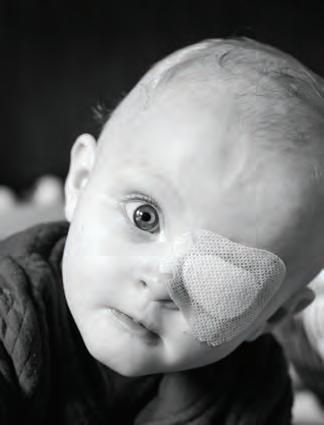
4 minute read
ORTHOPTICS AUSTRALIA
CATARACT KIDS AUSTRALIA AND ORTHOPTISTS
AS A PARENT OF A CHILD WITH CATARACTS, MEGAN PRICTOR KNOWS THE STRUGGLE OF AFFECTED FAMILIES. THAT’S WHY SHE SET UP CATARACT KIDS AUSTRALIA, A CHARITY THAT’S FORMED A STRONG BOND WITH ORTHOPTICS.
MEGAN PRICTOR
"ORTHOPTISTS ARE OFTEN THE FIRST PROFESSIONALS A NEWLYDIAGNOSED CHILD WITH CATARACT AND THEIR FAMILIES WILL SEE" Cataract Kids Australia is a registered charity promoting the vision of kids affected by cataract. As a parent of a child with bilateral congenital cataract, I founded the organisation in 2017 after many discussions with other families and healthcare professionals involved in caring for children with cataract.
Cataract Kids Australia exists to enhance the support and information provided to families, work with clinicians to optimise treatment outcomes, and improve connections with the research community. Here, I reflect on our approach that aims to influence and impact, leading to sustainable change rather than criticise as an ‘outsider’. This can be a tricky balancing act, considering our role also includes advocacy for individual families.
Orthoptists are often the first professionals a newly-diagnosed child with cataract and their families will see. Early on, orthoptists likely understand what the family then may not: that the story will not end with the baby’s successful lensectomy; that visual rehabilitation is a long (and hard) game, where complications are common; and, most importantly, that orthoptists will be that baby and family’s guide, advisor and cheer squad throughout.
Depending on location and context, orthoptists may be involved in assessing a child’s vision, prescribing occlusion therapy, ordering contact lenses and teaching families how to insert and remove them, and liaising with ophthalmology and other health professionals and support organisations. They will listen to parents articulating their anxieties about daily management and long-term outcomes, and engage with kids across all ages, moods, behaviours and capabilities. This means orthoptists are superbly placed to contribute and learn; to smooth the journey for each child and family and advocate for paediatric cataract care at a system level.
In establishing Cataract Kids Australia, I felt it was vital to engage with all relevant professional disciplines, principally ophthalmology, orthoptics,
Orthoptists play a key role guiding families who have a child with cataract. Image: Sarah Craven Photography.
optometry and others in allied health (eg. play therapy, occupational therapy), paediatrics and primary care. To that end, the corporate governance of the organisation has deliberately included an orthoptist and ophthalmologist, as well as me as a patient advocate, to ensure that at least some of the main disciplines have a ‘seat at the table’.
The benefits of this are both practical and in the optics. It means Cataract Kids can, at an organisational level, draw upon a deep understanding of clinical, structural and policy issues in care provision. It also means clinicians can see themselves and their professional peers as an important part of the overall undertaking rather than Cataract Kids Australia being pigeonholed as ‘just’ a peer support group. If the organisation is perceived as being only for patients and their families, there is a greater risk its efforts to improve diagnosis and treatment could be dismissed as simplistic or misunderstanding.
In December 2020, Cataract Kids entered a Memorandum of Understanding with Orthoptics Australia. This has significant benefits for both parties in our efforts to deliver a uniform message to the public, the professions, government, and other stakeholders. In practical terms it means both entities promote each other via their websites and newsletters, and that Cataract Kids can engage with Australian orthoptists more easily from ‘inside the tent’.
Beyond this formal agreement, the relationship between orthoptics and Cataract Kids includes orthoptists presenting online webinars for families on topics like occlusion therapy and vision testing; and joint advocacy on vision screening and funding gaps. Orthoptists are also involved in the nascent Paediatric Vision Alliance Australia together with Cataract Kids Australia and other entities such as Usher Kids Australia, CVI Community Australia and Charge Syndrome Australasia.
I believe Cataract Kids and Orthoptics Australia each benefit significantly from this purposeful engagement approach, and the benefits extend more broadly. Synergism makes our collective voices louder; it strengthens both individuals and the entities they represent. Our chances of achieving sustainable change are significantly enhanced because we are building on mutual trust, equipping each other with knowledge and resources, and celebrating joint wins.
I’m excited by our progress to date and the potential for future gains, particularly in enhancing families’ understanding of the critical role orthoptists play in the care of their child affected by cataract. I’m also motivated by our joint efforts to embed early childhood vision screening nationally and to improve the identification of eye problems in neonatal and primary care. n
ABOUT THE AUTHOR: Megan Prictor (LLB(Hons), PhD) is the founding director of Cataract Kids Australia and a founding member of the Paediatric Vision Impairment Alliance. She is also an editor with Cochrane Eyes and Vision.
ORTHOPTICS AUSTRALIA strives for excellence in eye health care by promoting and advancing the discipline of orthoptics and by improving eye health care for patients in public hospitals, ophthalmology practices, and the wider community. Visit: orthoptics.org.au






